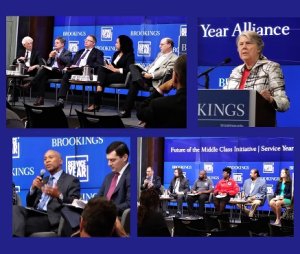
Cindy Wagner
Submitted by Cindy Wagner on

Panelists, National Service: Rebuilding America's Civic Fabric, Brookings Institution, October 10, 2019.
With the release of a new report, “Will America Embrace National Service?” the Brookings Institution convened a discussion on National Service: Rebuilding America’s Civic Fabric, October 10, 2019. The report and the event were co-sponsored by Brookings’ Future of the Middle Class Initiative and Service Year Alliance.
Co-authors John M. Bridgeland and John J. DiIulio Jr. discussed the report’s findings that public trust in the United States has declined over the last quarter century, including trust in the media, government, and the courts. The report focused on the concept of universal national service as a way “to rebuild our civic bridges.” It concludes with key policy prescriptions for providing full, one-year or longer service opportunities, linking military and civilian national service and educational access.
“Democracy cannot flourish when we do not trust each other and do not trust our institutions,” said Brookings senior fellow Isabel V. Sawhill of the Future of the Middle Class Initiative. Civic service opportunities bring people together in diverse socioeconomic and cultural groups, and research shows that, as is the case in the military, these mixed groups work well together while enhancing trust, she said.
Introducing the panel discussions, Brookings President John R. Allen described civic service as a way to build bridges rather than burning them. He noted that the research shows participants come away from their service experience as better people, better prepared to deal with crises in their communities ranging from natural disasters to enabling the elderly to stay in their homes.
Former U.S. Representative Joe Heck (R-Nev.), chairman of the National Commission on Military, National, and Public Service, described national service as an “opportunity to heal national wounds.” The commission’s goal is for all citizens to be “inspired and eager to serve,” he said. A common theme he has heard is that the United States has an “incredible culture of service” and that people want to know how they can serve. He recommended adding civic education back into schools’ entire curriculum, helping students understand both their rights and their responsibilities.
Barbara Stewart, CEO of the Corporation for National and Community Service (CNCS), noted that volunteerism is on the rise. National service has benefits for the volunteers, the recipients of service work, and the larger communities, she said, but we need to invest in the nonprofit infrastructure. CNCS now funds state programs, and while there are opportunities to do more, resources are not unlimited, she said, citing the need to strengthen partnerships.
Deval Patrick, former governor of Massachusetts, warned about the consequences of our distrust of one another. The Russian disinformation campaign in the 2016 U.S. elections were “insidious and brazen” and “shocking how easy it was because we don’t know each other.” It’s a generational responsibility, he said, to overcome our lack of knowledge about each other, which national service can help with. “Turn to each other, not on each other,” he said. It’s “for our own sake and the future of [our] democracy.”
Service Year Alliance CEO Jesse Colvin said he got a front-row view of America’s divides—and the “dystopian future” that could result—when he ran for Congress in 2018. Service is the best antidote, he said, as it enables diverse participants to work together and learn to trust one another. You find the same “connective tissue” in a foxhole as in Habitat for Humanity, he said.
Taimarie Adams, director of government relations at Service Year Alliance, outlined the proposed National Service Choice Act, which focuses on local community needs and local incentives for participants rather than mandatory service. There is bipartisan “appetite” for this legislation on Capitol Hill, she said, and it complements bills already out there.
Taking on the conservatives’ view, Peter Wehner, vice president and senior fellow at the Ethics & Public Policy Center, pointed out that national service is good for promoting unity among diverse peoples. Humans are hard-wired to be in communities, and national service promotes that, he said.
The final panel convened service program participants who shared their experiences: Tojuan C. Reed Jr., an AmeriCorps member and field team leader for FEMACorps; Kayla Whetzel, AmeriCorps member serving with City Year Washington, D.C.; Andrew E. Hansen III, a U.S. Army veteran and AmeriCorps alumnus working with the Delaware State Parks Veterans Conservation Corps; and Taylor Stone, an AmeriCorps VISTA member with Habitat for Humanity International.
Resources
National Service: Rebuilding America’s Civic Fabric (Brookings Institution event page).
“Will America Embrace National Service?” (report PDF) by John M. Bridgeland and John J. DiIulio Jr. Brookings Institution and Service Year Alliance (October 2019).
Cindy Wagner is AAI Foresight’s consulting editor and editor of Foresight Signals. She may be contacted at CynthiaGWagner@gmail.com.
